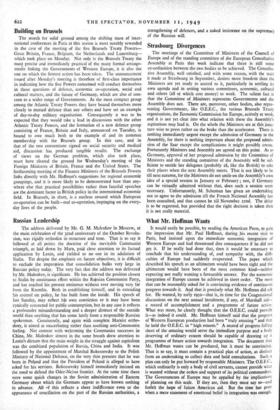Russian Leadership
The address delivered by Mr. G. M. Malenkov in Moscow, at the main celebration of the 32nd anniversary of the October Revolu- tion, was rigidly orthodox in tstructure and tone. That is to say it followed at all points the doctrine of the inevitable Communist triumph, as laid down by Marx, paid close attention to its factual application by Lenin, and yielded to no one in its adulation of Stalin. Yet despite the emphasis on future objectives, it is difficult to exclude the impresision that consolidation bulks very large in Russian policy today. The very fact that the address was delivered by Mr. Malenkov, is significant. He has achieved the position closest to Stalin by continuous effort within the Rutssian Communist Party, and has reached his present eminence without ever moving very far from the Kremlin. Both in establishing himself, and in extending his control on policy, he has built from the inside. His speech of last Sunday, may reflect hits own conviction or it may have been cynically concocted for public consumption, but in any case it reflects a profounder misunderstanding and a deeper distrust of the outside world than anything that has come lately from a responsible Russian spokesman. Consistently, and again with complete Marxist ortho- doxy, it aimed at exacerbating rather than soothing anti-Communist feeling. Not content with welcoming the Communist successes in China, Mr. Malenkov almost in the same breath drew attention to Lenin's dictum that the main weight in the struggle against capitalism was the combined population of Russia, China and India. It was followed by the appointment of Marshal Rokossovsky to the Polish Ministry of National Defence, on the very• thin pretexts that he was born in Poland and that the President of Poland is alleged to have asked for his services. Rokossovsky himself immediately insisted on the need to defend the Oder-Neisse frontier. At the same time there were some quick changes in the Soviet administration of Eastern Germany about which the Germans appear to have known nothing in advance. All of this reflects a sheer indifference even to the appearance of conciliation on the part of the Russian authorities, a strengthening of defences, and a naked insistence on the supremacy of the Russian will.


































 Previous page
Previous page